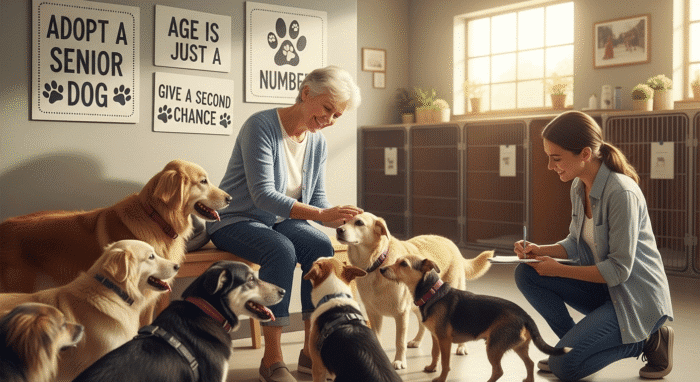Okay, let’s be honest. When you picture getting a dog, what comes to mind? Probably a fluffy puppy tumbling over its own paws, right? Or maybe a sleek, energetic young thing ready for endless games of fetch. But what about the seniors? The gray-muzzled, slightly slower pups with a lifetime of love to give? Many people don’t consider them. Which, I’ve got to admit, is a real shame.
Because here’s the thing: senior dog adoption is having a moment. A well-deserved one, in my opinion. And for good reason. These aren’t just “old dogs”; they’re seasoned companions, often house-trained, and usually past the chewing-everything-in-sight phase. Huge bonus!
Table of Contents
Why Choose a Golden Oldie? The Benefits of Senior Dog Adoption

I initially thought the appeal of senior dog adoption was purely about the “feel-good” factor – giving a deserving dog a loving home in their twilight years. And that’s definitely a part of it. But it’s so much more than that.
Think about it. Puppies are adorable, yes. But they’re also a ton of work. Constant supervision, potty training accidents, the aforementioned chewing… it’s exhausting! Senior dogs, on the other hand, often come with built-in manners. They’ve usually lived in a home before, so they know the drill. They’re often content with shorter walks and more cuddle time. And let’s not forget – their personalities are already established. What you see is what you get.
During my time volunteering at a local shelter, I saw firsthand how much senior dogs can blossom in a loving environment. One particularly memorable case was Buster, a 10-year-old Beagle who was surrendered when his owners moved. He was understandably withdrawn and sad at first. But after a few weeks of gentle care and attention, he transformed. He started wagging his tail, playing with toys, and even developed a goofy grin. He eventually got adopted by a retired couple who were looking for a calm, loving companion. And you know what? They said he was the perfect fit. You can find out more about Beagle health on Beagle Health Watch.
Addressing Common Concerns About Adopting a Senior Dog
Okay, I get it. There are legitimate concerns that people have about adopting an older dog. Health issues are probably the biggest one. And it’s true that senior dogs are more likely to have age-related ailments like arthritis, dental problems, or vision loss. But the truth is many of these conditions can be managed with proper veterinary care.
Plus, many shelters and rescues provide thorough health screenings for their senior dogs before they’re put up for adoption. They’ll often disclose any known medical conditions and offer advice on how to manage them. It’s all about transparency and making sure you’re prepared. I keep coming back to this point because it’s crucial.
Another concern? Shorter lifespan. It’s a valid point. You might not have as many years with a senior dog as you would with a puppy. But think about the quality of those years. You’re giving a deserving dog a loving home for their remaining time, and they’re giving you unconditional love and companionship in return. And sometimes, isn’t that what it’s all about?
Finding the Right Senior Dog For You
So, you’re convinced that senior dog adoption is a worthwhile endeavor? Awesome! Now, how do you find the right dog for you? First, do your research. Look into local shelters and rescue organizations. Many of them have websites where you can browse available dogs and read their bios.
When you visit a shelter, don’t be afraid to ask questions. Talk to the staff about the dog’s history, personality, and any known health issues. Spend some time with the dog to see if you connect. Take them for a walk, play with them, and just observe their behavior. It’s important to find a dog whose energy level and temperament match your lifestyle. Maybe you are retired and want to take care of senior dogs, you will also like DIY Dog Enrichment.
And remember, patience is key. It might take some time for a senior dog to adjust to a new home. They might be scared or confused at first. But with love, patience, and consistency, they’ll eventually come around. Trust me, it’s worth it.
The Financial Aspects: Senior Dog Care Costs
Let’s be real: dog ownership comes with expenses, and senior dogs can sometimes require more specialized care. But don’t let that scare you away. While it’s true that older dogs are more prone to health issues, there are ways to mitigate the financial burden. Pet insurance is an option, though it’s worth comparing plans carefully to see what’s covered, especially for pre-existing conditions.
Also, talk to your vet about ways to manage potential health issues proactively. Regular checkups and preventative care can often help catch problems early, before they become more expensive to treat. Some shelters even offer discounts on veterinary care for adopted senior dogs. It never hurts to ask!
FAQ: Common Questions About Senior Dog Adoption
How do I know if a senior dog is the right fit for my family?
That’s a great question! It really comes down to your lifestyle and what you’re looking for in a companion. If you’re seeking a dog who’s relatively low-energy, already house-trained, and doesn’t require constant supervision, a senior dog might be perfect. But if you’re looking for a high-energy dog to go on long runs with, a younger dog might be a better fit. Consider also the personalities of others in your household – do you have young children or other pets who might not appreciate a less energetic friend?
What are some of the most common health issues in senior dogs?
Senior dogs can be prone to various age-related health issues, including arthritis, dental disease, cataracts, kidney disease, and heart problems. However, not all senior dogs will develop these conditions, and many can be managed effectively with proper veterinary care. Regular checkups and preventative care are crucial for catching potential problems early.
Is more expensive than adopting a puppy?
It can be, depending on the dog’s health. Senior dogs may require more frequent vet visits and potentially medication to manage age-related conditions. However, the initial adoption fee for a senior dog is often lower than for a puppy. Plus, you’ll likely save money on training classes and damage to your belongings (since senior dogs are typically past the destructive chewing stage).
What if the senior dog I adopt has behavioral issues?
It’s possible, but many senior dogs are well-behaved and have already lived in a home before. If the dog does have behavioral issues, work with a qualified dog trainer or behaviorist who has experience with senior dogs. Patience and consistency are key. And remember, senior dogs are often very receptive to positive reinforcement training.
Ultimately, adopting a senior dog is a deeply rewarding experience. You’re giving a deserving dog a second chance at a loving home, and you’re gaining a loyal companion who will fill your life with joy. It’s a win-win situation. And who knows? You might just find that a senior dog is the best kind of dog.

